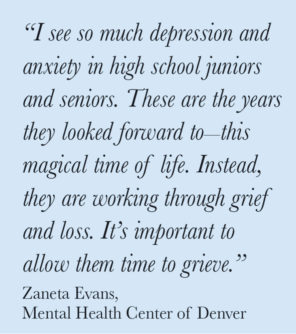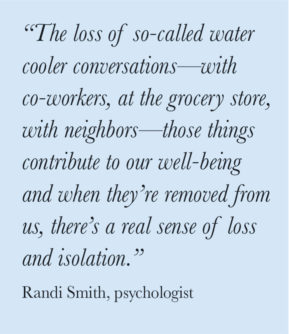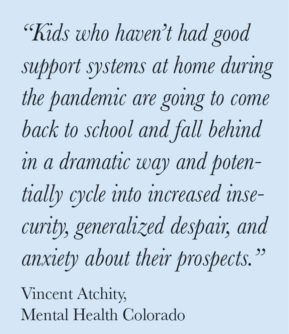 Sixteen-year-old Kate Sun said she’d always been a happy, active kid. A junior at George Washington High School, she played four sports and had a weekend job. But when the pandemic hit, all of that went away. “I couldn’t see my friends. I was completely isolated. The pandemic has been very hard on me.”
Sixteen-year-old Kate Sun said she’d always been a happy, active kid. A junior at George Washington High School, she played four sports and had a weekend job. But when the pandemic hit, all of that went away. “I couldn’t see my friends. I was completely isolated. The pandemic has been very hard on me.”
In talking with friends on social media, she quickly realized she wasn’t the only one struggling with mental health issues, so she decided to do a research project polling other students. The results? Eighty-eight percent of the high schoolers said they felt loneliness some or all of the time and 85-percent said they felt sadness some or all of the time. “The results didn’t surprise me. Everyone I talk to is hanging on by a thread waiting for this to be over,” said Sun.
The results also don’t surprise mental health professionals in Denver, who have seen a large spike in children and adolescents reaching out for help. Referrals to the school-based team at the Mental Health Center of Denver (MHCD) have more than doubled.
 Program manager Zaneta Evans sees children as young as five years old at MHCD’s Dahlia Campus and at the Crisis Center on Colfax. “Young children are struggling with isolation but they don’t know how to express it, so parents think their children are acting out,” said Evans. “Teens feel like they’re alone on an island. They wonder why they feel anxious or don’t have any energy or interest in doing things they used to love.”
Program manager Zaneta Evans sees children as young as five years old at MHCD’s Dahlia Campus and at the Crisis Center on Colfax. “Young children are struggling with isolation but they don’t know how to express it, so parents think their children are acting out,” said Evans. “Teens feel like they’re alone on an island. They wonder why they feel anxious or don’t have any energy or interest in doing things they used to love.”
While the Crisis Center has offered in-person counseling throughout the pandemic, many of its other centers have used telehealth communication, which presents its own challenges. “Some families don’t have access to computers or reliable internet, and when you’re talking to children or teens at home, you don’t know how much privacy they have—whether a parent is within earshot,” said Evans.
During this pandemic, MHCD has tried some innovative ways to help children and teens—sending art therapy kits to families and using the Minecraft computer game to help kids talk about their feelings. MHCD is also setting up a telehealth kiosk at Academy 360 Elementary School in Montbello for families which don’t have computer access.
 Park Hill therapist and Metropolitan State University professor Randi Smith says that in addition to children and youth, the parents of young children are also reporting increased levels of anxiety and depression as they juggle jobs and childcare duties. “It’s such a challenging time. A lot of people that I see say ‘What’s wrong with me? Why am I not coping better with this? I haven’t lost my job, I haven’t lost a loved one. So why am I so affected?’” Smith says it can be difficult to determine when to seek professional help, but anyone who is feeling hopeless or having suicidal thoughts should immediately reach out.
Park Hill therapist and Metropolitan State University professor Randi Smith says that in addition to children and youth, the parents of young children are also reporting increased levels of anxiety and depression as they juggle jobs and childcare duties. “It’s such a challenging time. A lot of people that I see say ‘What’s wrong with me? Why am I not coping better with this? I haven’t lost my job, I haven’t lost a loved one. So why am I so affected?’” Smith says it can be difficult to determine when to seek professional help, but anyone who is feeling hopeless or having suicidal thoughts should immediately reach out.
Smith is also seeing an increase in couples seeking marriage counseling. “The pandemic has forced couples to spend much more time together than usual and all the minor irritations pile up.” Although she normally prefers in-person counseling to telehealth, she has noticed that with marriage counseling, having both partners on separate screens—even in the same house—can foster better dialogue. “They’re more polite. I’ve seen some couples who have made much more progress because it’s brought down the level of hostility when they’re not next to each other.”
Smith thinks that although cases of Covid-19 have been declining, the mental health crisis is far from over. Vincent Atchity, president and CEO of the advocacy group Mental Health Colorado, goes one step further. He thinks the mental health crisis will get much worse before it gets better. He’s especially worried about what will happen to students next fall when they return to school. “We’ll have a great disparity between kids who have managed to do okay and kids who have been flailing because they don’t have stability in their homelife. Those kids will be thrown together and expected to meet the same kind of performance metrics.” His organization has been supportive of an effort making its way through the state legislature to scale back standardized testing to give both teachers and students some time to recover from the education inequities caused by the pandemic.
Atchity says he also applauds an effort by state representative Dafna Michaelson Jenet (D-Commerce City) to provide all school children in Colorado with an optional mental health screening before school starts in the fall, but he worries there won’t be enough places to refer students to get help. “We’ve got massive issues when it comes to access to care. Last year, Colorado ranked 47th for access to mental health care. We just don’t have the capacity to meet that need, so I’m very worried about what schools will be facing.”
If there’s a silver lining to all of this, Atchity says that the pandemic has finally gotten more people talking about mental health issues in ways they never have before. He hopes that will eventually lead to additional resources to meet the spiraling demand.




0 Comments